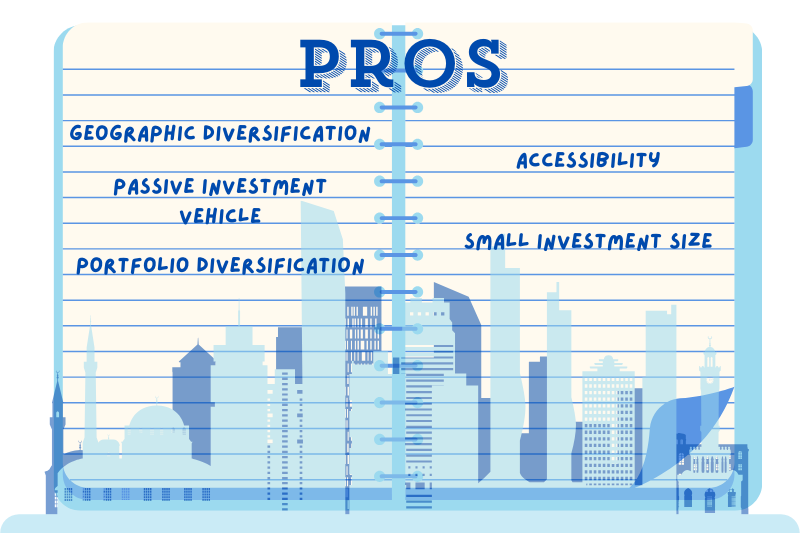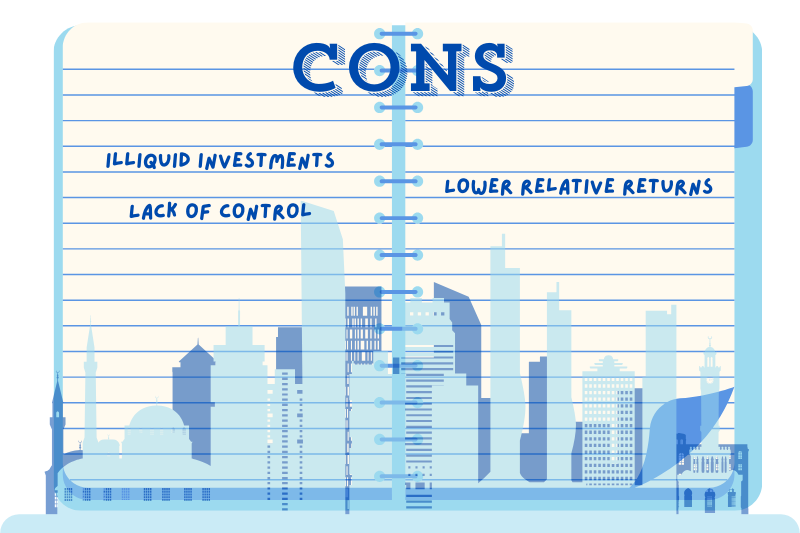Real estate crowdfunding involves raising money online for real estate purchases from a large group of investors.
Individuals and businesses use internet platforms and social media to access capital from many potential investors.
The concept is that many people can invest small amounts, quickly raising large sums of money.
Let’s get to the point.
Pros

Geographic Diversification
Different regions in the real estate market can perform very differently at the same time.
For instance, while the market in one city might be strong, another city could experience a downturn.
If you invest all your money in one location, you risk a negative return on investment due to local market issues that don’t affect the broader market.
Crowdfunding allows you to choose where to invest, spreading your risk across multiple locations.
Passive Investment Vehicle
Investing in real estate through crowdfunding offers the benefit of being a passive investment vehicle, unlike traditional real estate investments such as direct ownership.
Traditional investments often require significant time and effort to manage the property, ensure timely development, and handle associated risks.
With crowdfunded real estate investments, you invest with a third-party real estate developer or operator who takes on all these responsibilities.
You rely on the developer or operator to complete the work on time and within budget, eliminating the need for you to manage the property yourself.
This allows you to focus on other investment opportunities.
Portfolio Diversification
Diversifying your portfolio reduces the risk associated with a single investment by spreading it across multiple investments.
For example, instead of investing $100,000 solely in investment A, you could distribute that amount equally among five investments: A, B, C, D, and E. If investment A fails entirely, you would lose $100,000 if that was your only investment.
However, by spreading your investment, if one out of the five investments fails, you would only lose $20,000, thereby minimizing your overall risk.
Accessibility
Real estate investing has become much more accessible through crowdfunding.
Previously, private real estate investments were limited to high-net-worth individuals with the necessary capital and connections.
However, due to changes in the law and the rise of online crowdfunding platforms, these barriers have been removed.
Now, the entry point for real estate investments is significantly lower, allowing a broader range of investors to participate.
Small Investment Size
Crowdfunding has opened the door to real estate investing by allowing for much smaller investment sizes compared to traditional methods.
Previously, investing in real estate typically required tens or hundreds of thousands of dollars.
Now, some crowdfunding platforms enable investments with as little as $500.
This lower investment threshold allows more people to enter the real estate market, whether they are new investors wanting to test the waters or experienced investors seeking greater diversification.
Cons

Illiquid Investments
These investments cannot be easily converted to cash if needed.
Selling a property investment requires finding a buyer, which can take considerable time and may result in a decrease in property value.
In case of an emergency, cashing out of the investment can be nearly impossible.
Lack of Control
If you prefer to have control over your investments, real estate crowdfunding may not be suitable for you.
In crowdfunding, the property development is entirely managed by someone else.
Traditional investment methods, on the other hand, allow investors to manage the project themselves.
Suppose you have experience managing sizable projects and believe you can effectively handle a real estate project.
In that case, traditional investments provide more control over the development process, potentially making it easier to achieve your desired returns.
Lower Relative Returns
While real estate crowdfunding has many advantages, it’s important to be aware of its potential drawbacks.
One such drawback is that returns are generally lower compared to direct real estate ownership.
This is because the developer or operator also needs to earn a profit, which impacts your investment returns.
The actual return you receive will depend on various factors, including whether it is a debt or equity investment and the success of the project.
Typically, successful real estate crowdfunding investments yield returns of 8-10 percent for debt investments and 18-23 percent for equity investments.
Fun fact: Equity crowdfunding was once exclusively available to accredited investors such as banks, pension plans, insurance companies, and wealthy individuals. To qualify as an accredited investor, an individual needed an income exceeding $200,000 or a net worth over $1,000,000 . Recent changes have made equity crowdfunding more accessible to a broader range of investors according to SEC.
Investment Limits for Crowdfunding

There are risks in any type of crowdfunding investment, and the SEC has imposed investment limits for non-accredited investors.
Less than $124,000:
If your annual income or net worth is less than $124,000, you can invest up to $2,500 or up to 5% of the lesser of your annual income or net worth during any 12-month period.
More than $124,000:
If both your annual income and net worth are equal to or exceed $124,000, you can invest up to 10% of your annual income or net worth, whichever is lesser, during any 12-month period, with a maximum investment limit of $124,000.
Fun fact: According to Vantage Market Research, the Global Real Estate Crowdfunding Market is projected to reach a value of USD 161.8 billion by 2030, with an expected compound annual growth rate (CAGR) of 45.9% from 2023 to 2030. In 2022, the market was valued at USD 11.5 billion.
I’m Tanner Murphy, a retired real estate agent from California, now writing for propertyescape.net. I simplify California’s complex real estate laws for readers, making it easier to understand and navigate the market.
Related Posts:
- My Guide to Investing in Vacation Properties in…
- Where And How To Find Abandoned Property For Sale?…
- What is Steering in Real Estate? How to Avoid It?
- The Impact of California Wildfires on Real Estate Markets
- How to Avoid Real Estate Scams in California: 6 Tips…
- Proposition 13 Impact on California Real Estate:…







